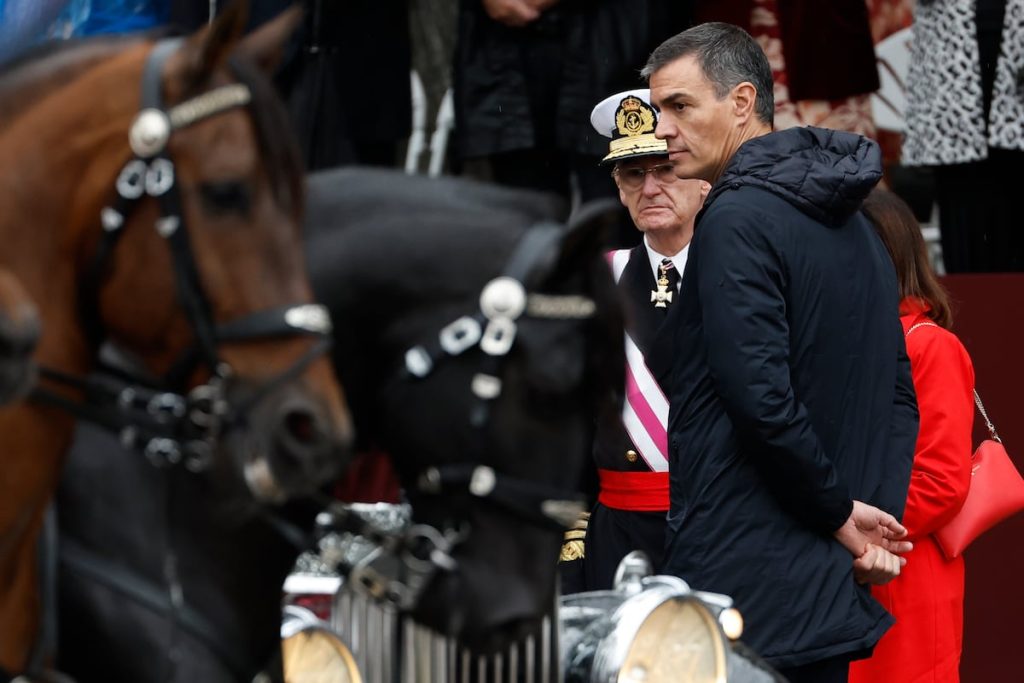The tense atmosphere that has engulfed the Congress of Deputies during the week has now transferred to the Royal Palace on Saturday. Following the National Day reception, the leader of the opposition, Alberto Núñez Feijóo, used the UCO report that implicates former minister José Luis Ábalos in the Koldo case to attack Pedro Sánchez. Feijóo criticized Sánchez for not holding a press conference with unlimited questions instead of attending the festive event. Sánchez, on the other hand, vehemently criticized the PP and Vox, accusing them of being the “Torquemada” of the opposition. The political tension escalated as Feijóo referred to the corruption scandal involving the Ministry of Transport, which Ábalos was linked to.
Amidst a military parade affected by rain, the focus shifted to political strife at the Royal Palace. Feijóo was uncompromising in his statements, expressing disbelief at how far the corruption scandal had reached and how close it had come to the government. Despite this, he ruled out initiating a motion of no confidence against the president at this time. The President of the Community of Madrid, Isabel Díaz Ayuso, who had previously called for Sánchez’s immediate resignation and early elections, showed solidarity with Feijóo. Meanwhile, Sánchez defended his actions and transparency in handling the situation, highlighting the expulson of Ábalos from the PSOE and the government’s achievements in the past year, such as amnesty law and CGPJ reform.
The escalating tension led to an encounter between the president of the Association of Victims of Terrorism (AVT), Maite Araluce, and Sánchez during a media interaction. Araluce criticized Sánchez for not responding to letters from the AVT regarding the controversial legal reform that could result in the release of several ETA prisoners. Feijóo acknowledged that the display of faces of 12 socialists murdered by ETA, which had angered the victims’ families, was a “questionable” gesture. He also refrained from calling the president to the investigation commission in the Senate regarding the case involving his wife, Begoña Gómez.
At the Royal Palace reception, Sánchez attended without his wife, who had also been absent the previous year. Gómez has been at the center of a political storm since being implicated in influence peddling and corruption allegations following a lawsuit filed by Manos Limpias. In a gesture towards normalization, the President of the Catalan Generalitat, Salvador Illa, attended the event to demonstrate improved institutional relations between Catalonia and the rest of Spain. Illa, the first Catalan president in 14 years to attend the reception after a period of separatist governments, emphasized Catalunya’s commitment to Spain and defended the new financing model that gives special consideration to Catalonia.
Overall, the political tensions that have gripped Spain in recent days have intensified at the Royal Palace, with both the government and opposition criticizing each other’s actions and policies. The corruption scandal involving José Luis Ábalos has further escalated the confrontation between the parties. The presence of Salvador Illa at the event symbolizes efforts towards reconciliation and normalizing relations between Catalonia and the central government. The conflicting narratives and accusations highlight the polarized political landscape in Spain, with both sides firmly entrenched in their positions. The challenges facing the country in terms of governance, transparency, and unity are evident in the interactions and statements made by the leaders at the Royal Palace.















